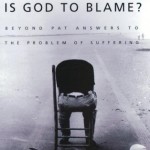We run our website the way we wished the whole internet worked: we provide high quality original content with no ads. We are funded solely by your direct support. Please consider supporting this project.

Do Angels and Demons Really Exist?
While the supremacy of God is never qualified in the Bible, this supremacy is not strictly autocratic. Other “gods” or spiritual entities like angels and demons are not mere puppets of the God of the Bible. Rather, they appear to be personal beings who not only take orders but also are invited to give input to their Sovereign (see 1 Kings 22:20; Is 6:8). They collectively constitute a type of “heavenly counsel.” These gods never rival the Creator’s authority. Thus they are never construed as major competing deities.
In sharp contrast to the Augustinian monopolizing view of divine sovereignty, the sovereign One in this concept invites and responds to input from both his divine and human subjects. The supplications and decisions of his creatures genuinely affect him, to the point where he may even altar previous plans in response to his creatures’ requests and behavior.
This notion that there exists a council, or a society, of divine beings between humans and God who, like us, have free wills and can therefore influence the flow of history for better or for worse, is obviously jarring to a number of Western worldview assumptions. Indeed, for many believers it is foreign to their Western Christian assumptions as well. For a variety of reasons, Westerners have trouble taking seriously the “world in between” us and God. Even when Westerners do theoretically acknowledge the existence of “angels,” we tend to view them as mindless, volitionless, wholly innocuous marionettes completely controlled by the will of their Creator.
If we take the biblical teaching on gods seriously, we must confess that our Western assumptions are erroneous. Indeed, the “heavenly” world largely overlaps our “earthly” world and can hardly be said to form two worlds at all. The “world in between” is, from a scriptural perspective, simply part of the cosmos.
This stands in contrast to the Greek metaphysical assumption which has shaped our Western worldview that the “heavenly” is composed of timeless “forms” that lack all contingency, a notion that exercised a profound influence on Christian theology and contributed to the church’s eventual abandonment of a warfare worldview.
In Scripture, as opposed to the dominant Hellenistic philosophical tradition that so influenced Augustine and other theologians of his day, there was nothing “heavenly” about being timeless, immutable, purely actual and devoid of contingency. There was nothing “perfect” about being an “Unmoved Mover” (Aristotle), and no sense could be made of saying that “time is the moving image of eternity” (Plato). Though it forms the cornerstone of the classical tradition of the Western church, no biblical author ever dreamed of such a notion.
The Bible depicts a “heavenly” world that parallels the “earthly” world, one where freedom and contingency in the “earthly” world has its counterparts in the counsel of heaven. The two worlds overlap and influence one another.
Because of our indebtedness to Greek thought through the classical view of God as well as our indebtedness to Enlightenment naturalism, modern Westerners have difficulty affirming the existence of—let alone the significant freedom and power of—this “world in between.” For these reasons many conservative theologians have difficulty positing genuine contingency in God himself.
But this theological tradition, more than anything else, is what creates the problem we have with explaining the nature of evil. In biblical terms, the evil experienced today—whether the beheading of martyrs or earthquakes—might be the result of evil human intentions. Or it might be due to a malicious “prince” over a part of the world, or some other cosmic power. None of these acts of evil could be an ordained feature of a secret blueprint God has for the whole world.
The character of God can remain untarnished in the face of the terrifying dimensions of our experience only to the degree that our view of the free, contingent world in between us and God is robust. Only to the extent that we unambiguously affirm that angels and humans have significant power to thwart God’s will and inflict suffering on others can we unambiguously affirm the goodness of God in the face of the evil being manifest in our world today.
-Adapted from God at War pages 130-141
Image by jslee_ via Flickr
Category: Q&A
Tags: Angels, Demons, Evil, Free Will, Spiritual Warfare, Warfare Worldview
Topics: Spiritual Warfare, Cosmic Conflict
Related Reading

Quotes to Chew On: Prayer and Finitude
“We pray as we live: in a sea of ambiguity. This is not because we are fallen but because we are finite. And we are inclined to forget we are finite. We ignore the ambiguity that accompanies our finitude, and thus we claim to know what we can’t know. We reduce the unfathomable complexity of…

Podcast: Why Is God SO Tough on Angels?
Greg discusses God’s attitude towards angels. http://traffic.libsyn.com/askgregboyd/Episode_0207.mp3

Put on the Armor of God
The whole of the Christian life is an act of war against the enemy as we follow Jesus in storming the gates of hell (See post.) No passage better illustrates this than Paul’s metaphor of spiritual armor from Ephesians 6. He writes that Christians are to “be strong in the Lord and in the strength…

Is There an Actual Satan?
Roger Olson wrote an excellent piece on how contemporary Christianity has tended to ignore or altogether extract Satan from the Biblical text. He explores some of the possible reasons for it and also discusses his own journey as he wrestled with the belief in the demonic realm. Really interesting. Here’s a personal experience of the…

Podcast: Books About Spiritual Warfare From a 1st Century Ancient Near East Perspective?
Greg shows off some of his books in his library. http://traffic.libsyn.com/askgregboyd/Episode_0457.mp3

Why Did God Allow Evil?
Is it possible to force people to love? Powerful people may be able to force others to do just about anything. Through psychological or physical torture, they may succeed in forcing them to curse their own children to deny their faith. They may even succeed in forcing others to act and say loving things to…
